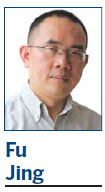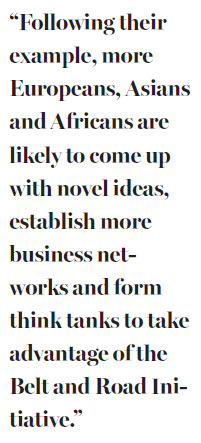Bottom-up response is energetic
Updated: 2016-05-06 06:56
By Fu Jing(China Daily Europe)
|
|||||||||
Academia, businesses and think tanks in Europe are establishing ways to cooperate with China's Belt and Road Initiative
In recent weeks, China's Belt and Road Initiative - the Silk Road Economic Belt and 21st Century Maritime Silk Road - has gotten several bottom-up but energetic responses from Europe.
Among them was the formation of the Europe and China tourism and cultural development committee in Brussels. The committee is the brainchild of Bernard Dewit, chairman of the Belgian-Chinese Chamber of Commerce, and other key European figures.
The rationale behind the formation of the committee is to better serve Chinese tourists, whose steadily rising numbers have become a key driver of Europe's tourism sector and its infrastructure development.

Before the committee was formed, China EU, a Brussels-based nonprofit with the aim of promoting EU-China exchanges in the internet and telecommunications sectors, had organized a panel discussion in London on how to insert digital content into the Belt and Road Initiative and develop a "digital Silk Road".
In March, France-based Neoma Business School had organized a forum in Paris to discuss how to make best use of Europe's green technology and know-how and China's capital and manufacturing capacities, in order to ensure the Belt and Road Initiative adopts a greener, sustainable approach.
And before the Paris forum, Jan Kohout, an adviser to Czech President Milos Zeman on Chinese affairs, set up the first think tank in Europe focusing on Belt and Road Initiative research.
These four developments in Europe come nearly three years after President Xi Jinping announced the initiative in 2013 to better connect Asia, Europe and Africa. Since then, up to 20 governments in Europe have echoed China's proposals. Even the European Union, as a whole, is working with China to launch joint funds to help synergize the Belt and Road Initiative and European investment schemes.
These developments are important because they come from academia, businesses and think tanks in Europe, and could further enrich the initiative. They also show that Europe's nongovernmental sectors recognize the potential of the initiative, which in turn may encourage more Europeans to participate in discussions on the massive initiative for intercontinental connectivity.

The governments of European countries and China should pay close attention to these developments and the outcomes they yield, because they could help them better implement the initiative.
The focus of the initiative should be sustainable and green economic development, bridging the digital gap, and enhancing cultural and tourism exchanges among Asian, European and African countries, though infrastructure construction must also be given priority in countries where it is required.
And it is here that a pioneering vision comes into play. After announcing the Belt and Road Initiative, China has given topmost priority to common prosperity and development, instead of geopolitical considerations. Contrary to speculation, it has no intention of building a "private road" to penetrate the markets of Europe or Africa.
The organizers of the London and Paris forums and other European organizations know these facts well and understand that China's initiative can create more jobs and business opportunities, which will help sluggish economies recover. Following their example, more Europeans, Asians and Africans are likely to come up with novel ideas, establish more business networks and form think tanks to take advantage of the Belt and Road Initiative.
China is still mobilizing governments worldwide to support the initiative, although more than 70 countries have already done so. China, nevertheless, should also make efforts to win greater support from the nongovernmental sector, because collective support and participation is essential for the success of Belt and Road Initiative and to ensure common prosperity.
The author is deputy editor of China Daily European Weekly. Contact the writer at fujing@chinadaily.com.cn
Today's Top News
Inspectors to cover all of military
Britons embrace 'Super Thursday' elections
Campaign spreads Chinese cooking in the UK
Trump to aim all guns at Hillary Clinton
Labour set to take London after bitter campaign
Labour candidate favourite for London mayor
Fossil footprints bring dinosaurs to life
Buffett optimistic on China's economic transition
Hot Topics
Lunar probe , China growth forecasts, Emission rules get tougher, China seen through 'colored lens', International board,
Editor's Picks

|

|

|

|

|

|







